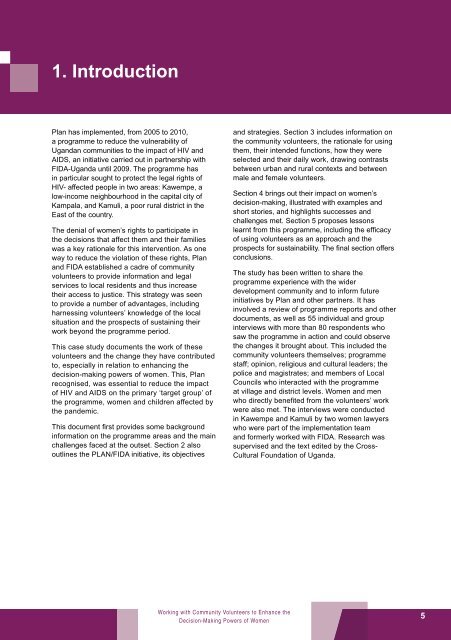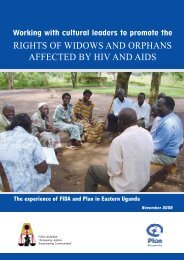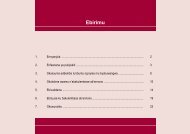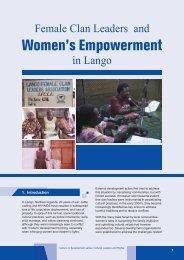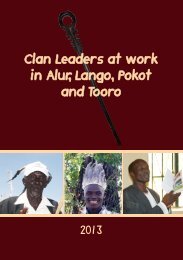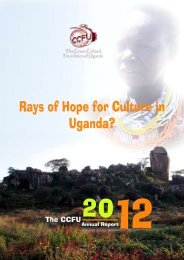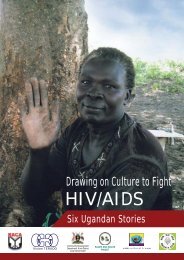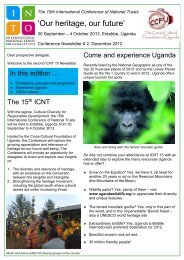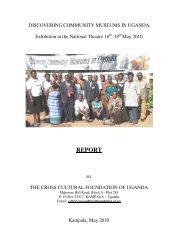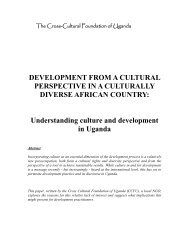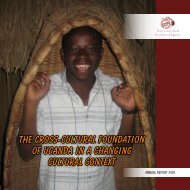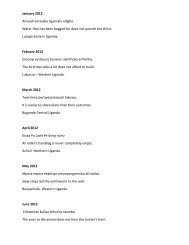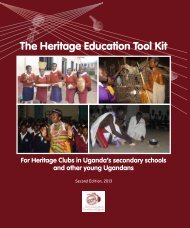Working With Community Volunteers to enhance the decision ...
Working With Community Volunteers to enhance the decision ...
Working With Community Volunteers to enhance the decision ...
Create successful ePaper yourself
Turn your PDF publications into a flip-book with our unique Google optimized e-Paper software.
1. IntroductionPlan has implemented, from 2005 <strong>to</strong> 2010,a programme <strong>to</strong> reduce <strong>the</strong> vulnerability ofUgandan communities <strong>to</strong> <strong>the</strong> impact of HIV andAIDS, an initiative carried out in partnership withFIDA-Uganda until 2009. The programme hasin particular sought <strong>to</strong> protect <strong>the</strong> legal rights ofHIV- affected people in two areas: Kawempe, alow-income neighbourhood in <strong>the</strong> capital city ofKampala, and Kamuli, a poor rural district in <strong>the</strong>East of <strong>the</strong> country.The denial of women’s rights <strong>to</strong> participate in<strong>the</strong> <strong>decision</strong>s that affect <strong>the</strong>m and <strong>the</strong>ir familieswas a key rationale for this intervention. As oneway <strong>to</strong> reduce <strong>the</strong> violation of <strong>the</strong>se rights, Planand FIDA established a cadre of communityvolunteers <strong>to</strong> provide information and legalservices <strong>to</strong> local residents and thus increase<strong>the</strong>ir access <strong>to</strong> justice. This strategy was seen<strong>to</strong> provide a number of advantages, includingharnessing volunteers’ knowledge of <strong>the</strong> localsituation and <strong>the</strong> prospects of sustaining <strong>the</strong>irwork beyond <strong>the</strong> programme period.This case study documents <strong>the</strong> work of <strong>the</strong>sevolunteers and <strong>the</strong> change <strong>the</strong>y have contributed<strong>to</strong>, especially in relation <strong>to</strong> enhancing <strong>the</strong><strong>decision</strong>-making powers of women. This, Planrecognised, was essential <strong>to</strong> reduce <strong>the</strong> impac<strong>to</strong>f HIV and AIDS on <strong>the</strong> primary ‘target group’ of<strong>the</strong> programme, women and children affected by<strong>the</strong> pandemic.This document fi rst provides some backgroundinformation on <strong>the</strong> programme areas and <strong>the</strong> mainchallenges faced at <strong>the</strong> outset. Section 2 alsooutlines <strong>the</strong> PLAN/FIDA initiative, its objectivesand strategies. Section 3 includes information on<strong>the</strong> community volunteers, <strong>the</strong> rationale for using<strong>the</strong>m, <strong>the</strong>ir intended functions, how <strong>the</strong>y wereselected and <strong>the</strong>ir daily work, drawing contrastsbetween urban and rural contexts and betweenmale and female volunteers.Section 4 brings out <strong>the</strong>ir impact on women’s<strong>decision</strong>-making, illustrated with examples andshort s<strong>to</strong>ries, and highlights successes andchallenges met. Section 5 proposes lessonslearnt from this programme, including <strong>the</strong> effi cacyof using volunteers as an approach and <strong>the</strong>prospects for sustainability. The fi nal section offersconclusions.The study has been written <strong>to</strong> share <strong>the</strong>programme experience with <strong>the</strong> widerdevelopment community and <strong>to</strong> inform futureinitiatives by Plan and o<strong>the</strong>r partners. It hasinvolved a review of programme reports and o<strong>the</strong>rdocuments, as well as 55 individual and groupinterviews with more than 80 respondents whosaw <strong>the</strong> programme in action and could observe<strong>the</strong> changes it brought about. This included <strong>the</strong>community volunteers <strong>the</strong>mselves; programmestaff; opinion, religious and cultural leaders; <strong>the</strong>police and magistrates; and members of LocalCouncils who interacted with <strong>the</strong> programmeat village and district levels. Women and menwho directly benefi ted from <strong>the</strong> volunteers’ workwere also met. The interviews were conductedin Kawempe and Kamuli by two women lawyerswho were part of <strong>the</strong> implementation teamand formerly worked with FIDA. Research wassupervised and <strong>the</strong> text edited by <strong>the</strong> Cross-Cultural Foundation of Uganda.<strong>Working</strong> with <strong>Community</strong> <strong>Volunteers</strong> <strong>to</strong> Enhance <strong>the</strong>Decision-Making Powers of Women5


